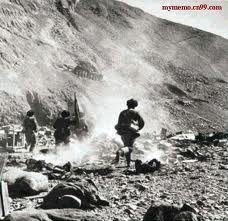Shinigami
SENIOR MEMBER

- Joined
- Mar 15, 2011
- Messages
- 3,611
- Reaction score
- -10
At the end of 1986, India granted statehood to Arunachal Pradesh, which is an area claimed by China but administered by India. The Chinese government proceeded to protest. But the military movements in Tawang, taken in conjunction with this political action were seen as a provocation by the Chinese. In early 1987 Beijing's tone became similar to that of 1962, and with the Indian Army refusing to stand down, Western diplomats predicted war.

The Indian response to the Chinese buildup was Operation Falcon and involved movements across the Sino-Indian border. Mi-26 heavy lift helicopters were used to deploy Infantry fighting vehicles and tanks into North Sikkim in the east and Demchok in the west. These deployments were viewed as particularly threatening by the PLA because they seemed to indicate that India had moved from a strategy of defence in its own territory to that of a larger offensive involving all of Arunachal Pradesh.


The result was a thaw. Indian Foreign Minister N.D. Tiwari arrived in Beijing in May 1987 en route to Pyongyang, North Korea. He carried with him messages from Indian leaders that there was no intention on New Delhi's part to aggravate the situation. The first formal flag meeting to discuss the freezing of the situation since 1962, was held on the fifth of August 1987 at Bum La in the aftermath of the Wangdung affair. Both sides decided to take up talks with renewed urgency and the following year, Rajiv Gandhi visited Beijing, returning Zhou Enlai's '60s visit.
Indian Foreign Minister N.D. Tiwari arrived in Beijing in May 1987 en route to Pyongyang, North Korea. He carried with him messages from Indian leaders that there was no intention on New Delhi's part to aggravate the situation. The first formal flag meeting to discuss the freezing of the situation since 1962, was held on the fifth of August 1987 at Bum La in the aftermath of the Wangdung affair. Both sides decided to take up talks with renewed urgency and the following year, Rajiv Gandhi visited Beijing, returning Zhou Enlai's '60s visit.
Aftermath
Both India and China realised the danger of inadvertent conflict and after initial posturing the decision was made to de-escalate their deployments. The Sumdorong Chu fallout was that India and China decided to restart their dialogue on a new and more urgent basis. After Rajiv Gandhi's September 1988 visit, there was a hiatus of sorts because of political turmoil in India. But finally in 1993, the two countries signed an agreement to ensure peace along the LAC.
The agreement brought in an interesting concept of "mutual and equal" security where thinning of forces was envisaged, based on geographical and logistical considerations. However, its most important element is to have the two sides work out a mutually acceptable Line of Actual Control. As of now the two sides have their own versions of the Line and there are points, especially in the Sikkim-Bhutan-India trijunction, the Sumdorong Chu area and so on where the claims are disputed.
Moral of the story: Never deal with China from a position of weakness

The Indian response to the Chinese buildup was Operation Falcon and involved movements across the Sino-Indian border. Mi-26 heavy lift helicopters were used to deploy Infantry fighting vehicles and tanks into North Sikkim in the east and Demchok in the west. These deployments were viewed as particularly threatening by the PLA because they seemed to indicate that India had moved from a strategy of defence in its own territory to that of a larger offensive involving all of Arunachal Pradesh.


The result was a thaw.
 Indian Foreign Minister N.D. Tiwari arrived in Beijing in May 1987 en route to Pyongyang, North Korea. He carried with him messages from Indian leaders that there was no intention on New Delhi's part to aggravate the situation. The first formal flag meeting to discuss the freezing of the situation since 1962, was held on the fifth of August 1987 at Bum La in the aftermath of the Wangdung affair. Both sides decided to take up talks with renewed urgency and the following year, Rajiv Gandhi visited Beijing, returning Zhou Enlai's '60s visit.
Indian Foreign Minister N.D. Tiwari arrived in Beijing in May 1987 en route to Pyongyang, North Korea. He carried with him messages from Indian leaders that there was no intention on New Delhi's part to aggravate the situation. The first formal flag meeting to discuss the freezing of the situation since 1962, was held on the fifth of August 1987 at Bum La in the aftermath of the Wangdung affair. Both sides decided to take up talks with renewed urgency and the following year, Rajiv Gandhi visited Beijing, returning Zhou Enlai's '60s visit.Aftermath
Both India and China realised the danger of inadvertent conflict and after initial posturing the decision was made to de-escalate their deployments. The Sumdorong Chu fallout was that India and China decided to restart their dialogue on a new and more urgent basis. After Rajiv Gandhi's September 1988 visit, there was a hiatus of sorts because of political turmoil in India. But finally in 1993, the two countries signed an agreement to ensure peace along the LAC.
The agreement brought in an interesting concept of "mutual and equal" security where thinning of forces was envisaged, based on geographical and logistical considerations. However, its most important element is to have the two sides work out a mutually acceptable Line of Actual Control. As of now the two sides have their own versions of the Line and there are points, especially in the Sikkim-Bhutan-India trijunction, the Sumdorong Chu area and so on where the claims are disputed.
Moral of the story: Never deal with China from a position of weakness




 a chinese advising others on humility thats new
a chinese advising others on humility thats new 



